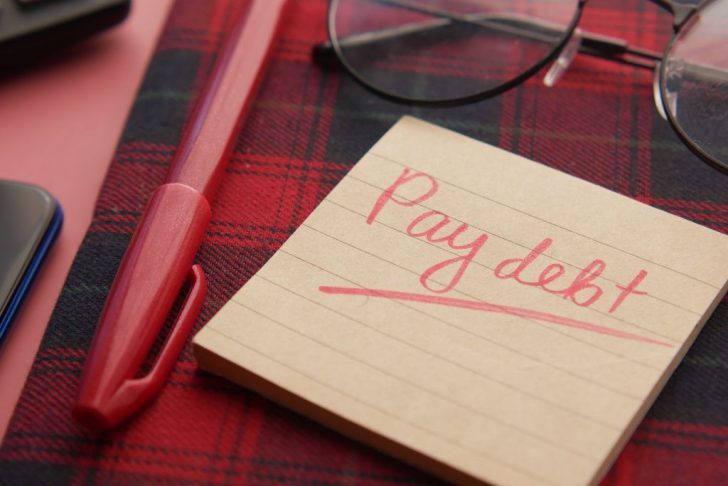
Paying Off Your Debt Using a Home Equity Loan? Consider These Pros & Cons

As a homeowner, you may have heard of the option to pay off your debt using a home equity loan. A home equity loan is one that allows you to borrow against the equity in your home to pay off outstanding debts or finance other expenses.
While this option may seem tempting due to its low interest rates and tax deductibility, it is important to consider both the pros and cons before taking out a home equity loan. Now, let’s go ahead and discuss the benefits and drawbacks of using a home equity loan to pay off debt so that you can make an informed decision about your financial situation.

Towfiq / Unsplash / Before you make a financial decision, weigh all the pros and cons of your decision.
Pros: Low-Interest Rates
One of the main benefits of taking out a home equity loan is the low interest rates. Since you are using your home as collateral, these loans typically come with lower interest rates compared to credit cards or personal loans. Thus, this can save you a significant amount of money in interest over the life of the loan.
Tax Deductibility
Another pro of using a home equity loan to pay off debt is the potential tax deductibility. If you use the loan to make improvements to your home, the interest paid may be tax deductible.
However, it is important to note that the 2017 Tax Cuts and Jobs Act placed limitations on the deductibility of home equity loan interest. Consult with a tax advisor to understand how this might impact you.

Mikhail / Pexels / One of the foremost advantages of a home equity loan is that it comes with low interest rates.
Potential for Consolidation
If you have several high-interest debts, a home equity loan can potentially allow you to consolidate those debts into one loan with a lower interest rate. In turn, this can simplify your payments and potentially save you money on overall interest.
Cons: Risk of Foreclosure
Taking out a home equity loan means that you are putting your home up as collateral. This means that if you are unable to make payments, the lender can foreclose on your home. This can be a significant risk, especially if you are already struggling to make ends meet.
Increased Debt
While a home equity loan can potentially save you money on interest, it is important to be aware that it is still debt that you will need to pay back. If you are not able to make payments, you could find yourself in a worse financial situation than before.

Photo Mix / Pexels / By relying solely on a home equity loan, you are putting your home at potential risk.
Possible Closing Costs and Fees
Just like with a mortgage, taking out a home equity loan can come with closing costs and other fees. Be sure to factor these costs into your decision-making process.
It is Not a Cure-all Solution
While a home equity loan can be an effective way to pay off debt, it is important to remember that it is not a cure-all solution. In addition to taking out the loan, it is important to address the underlying issues that led to the debt in the first place. This may involve budgeting, reducing expenses, and increasing income.
More inFinancial Adviser
-
Will Governor Kugler Push for More Rate Cuts as Inflation Eases?
Federal Reserve Governor Kugler supports the central bank’s recent interest rate cut and plans to advocate for more reductions if inflation...
October 18, 2024 -
Four Seasons Hotel Milano Introduces Personal Styling With Vittoria de Carlo
When it comes to fashion, Milan is unmatched, blending elegance with avant-garde trends. To uncover the heart of Milan’s fashion scene,...
October 9, 2024 -
The Most Successful Female Celebrity Brands
In today’s world, many female celebrities are not just shining in the entertainment industry but also making significant strides as entrepreneurs....
October 1, 2024 -
How to Incorporate Sustainable Outdoor Activities Into Your Travel Adventures
Opting for sustainable outdoor activities may seem challenging at first, but it’s an essential choice for preserving our environment. While integrating...
September 26, 2024 -
Here’s How You Can Get Low Interest on Loans in 2024 & Beyond
How to get a low-interest loan? Well, it is a question many Americans seek an answer to. After all, interest rates...
September 20, 2024 -
How to Buy the Perfect Men’s Belt Online
Selecting the right belt size might seem straightforward, but it can be more nuanced than simply matching it to your pants...
September 12, 2024 -
Why Joey Lawrence and Samantha Cope Parted Ways After 2 Years of Marriage
In a surprising turn of events, Joey Lawrence’s divorce from Samantha Cope has become a topic of widespread discussion. The couple,...
September 2, 2024 -
Must-Visit Tourist Attractions in Brussels
Exploring Fairytale Cities (Bruges and Ghent) One of the best things to do in Brussels is to take a day trip...
August 28, 2024 -
What Is a Write Off and How Companies Use Them?
Understanding the Nuances of Write-Offs Understanding the nuances of what is a write-off is essential for businesses. While the basic concept...
August 23, 2024














You must be logged in to post a comment Login